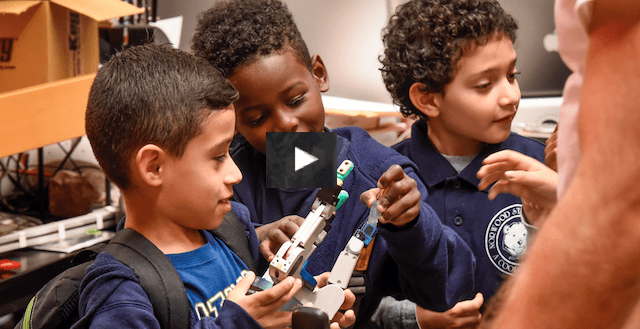USC Viterbi School of Engineering’s VAST program is a collaborative effort among students, teachers, and parents, to prepare K-12 students for STEM curriculum and curiosity.
Videos made possible by USC’s Alliance for Civic Engagement programs highlight series. For more information contact civic.engagement@usc.edu.
Viterbi School of Engineering Community Programs

Viterbi Adopt-a-School, Adopt-a-Teacher (VAST) – VAST fully embraces diversity and inclusiveness in its K-12 outreach. VAST provides and supports STEM education in K-12 schools, after-school groups, and organizations,focusing particularly on the neighborhoods around the University of Southern California campuses, which are populated by historically under-represented demographic groups. Partner schools serve populations that are atleast 97% Latino/Hispanic and/or African-American. 85% or more ofthose students are designated Title 1 and participate in free lunch programs.
VAST targets girls in outreach and media representations, recognizing theimportance of securing positive STEM attitudes at even the earliest ages. Some of the VAST activities include:
NSF Graduate Fellowship in K-12 STEM Education
The Body Engineering Los Angeles is an NSF GK-12 program at the Viterbi School that involves and prepares several of our best Ph.D. students to become science, technology, engineering and mathematics (STEM) leaders of tomorrow through a fellowship that incorporates extensive training and K-12 classroom experience. The program’s research theme is body engineering, and emphasizes the concept that the human body is a machine that can be studied, experimented upon, analyzed, and augmented.
Engineering Medical Therapeutic Technologies-Research Experiencefor Teachers
The NSF-sponsored Engineering Medical Therapeutic TechnologiesResearch Experience for Teachers (EMT2-RET) Site Program supportsthe involvement of high school and community college STEM teachers inengineering and computer science research focused on medical therapeutictechnologies conducted in Viterbi School of Engineering (VSoE) andBiomimetic MicroElectronic Systems Engineering Research (BMES ERC)laboratories at the University of Southern California.
o Middle School Literacy Achievement in Health, Math and Science
Supported by the California Postsecondary Education Commission, thisprogram is affiliated with the Homeland Security Center for Risk andEconomic Analysis of Terrorism Events (CREATE), and the Center forEmerging Materials and Solid State Lighting with the goal of improvingmiddle school STEM achievement. This program is located in ParamountUnified School District and is a middle school teacher training and middleschool curricular intervention program focused both on STEM educationand science literacy.
o Inner City Civil and Environmental Engineering Academy
Supported by the National Science Foundation and located in the InnerCity Education Foundation (ICEF) Charter School organization in LosAngeles, this project aims at leading middle and high school students toengineering by providing them with innovative engineering educationalmaterials, pedagogy and curriculum that have dramatically improved thecontent knowledge and retention of students in engineering at USC. Thefocus of the academy is environmentally and technology relevant STEMsecondary education and teacher professional development with anemphasis on increasing students’ science literacy.
The CS@SC Summer Camps
The camps are sponsored by the Institute for Education, Raytheon, the Westly Foundation and the Viterbi School and are designed to provide students with an early education into computer science, engineering, and applied physical science, which are not typically covered in formal K12 curricula. The camps are not designed to convince students to major in these fields when they reach college but rather to allow them to make an informed decision about different fields that may not receive as much exposure as ones they see on a daily basis. Studies have shown that students who are exposed to computer science and engineering fields at a young age are more likely to excel in academic fields such as science and mathematics.Although the camps are open to boys and girls, we have a particular interest in encouraging the education of girls in the computing field. We would like to continue to encourage girls into the field, and research has shown that if girls are exposed to computer science or engineering fields before entering high school (and possibly middle school), they are more likely to pursue more difficult science and mathematics classes. Since these fields do not have any inherent advantages based on gender, there is no reason the field should not support an equal population of girls and
boys.
Many other activities also include:• Summer programs
o ExxonMobil Bernard Harris Summer Science Camp – two week,residential summer camp for middle school students funded by ExxonMobil. Students work collaboratively on hands-on projects and arementored by ExxonMobil engineerso Mission Engineering – one week commuter program for local high schoolstudents providing opportunities for students to learn more aboutengineering and science concepts• Teacher training programso Explore Engineering – one week residential program for South Koreanteachers and students. Teachers go through training, while students
explore engineering through hands-on activities.
• FIRST Robotics – sponsor of the southern California regional competition.Mentorship provided to local schools with FIRST Robotics teams• Other programso Teams Competition – sponsorship of regional competition that occursannually for middle and high school students designed to help themdiscover their potential for engineering. During the one-day competition,students apply math and science knowledge to solve real-world problems.Each year a new theme is presented, but all themes are based on the NAE
Grand Challenges.
For more information, contact Katie Mills.
https://www.facebook.com/ViterbiOutreach
